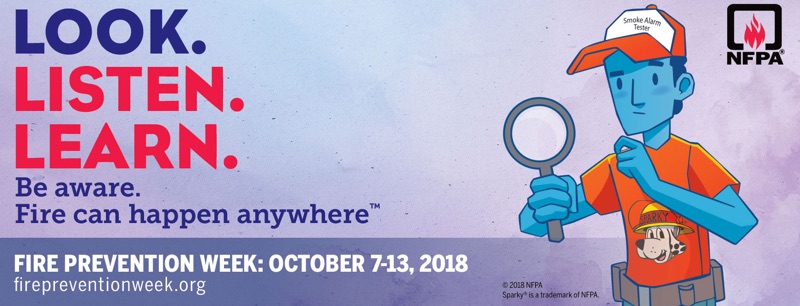
“Look. Listen. Learn. Be aware. Fire can happen anywhere.” is the theme for this year’s National Fire Prevention Week which will be observed October 7th through the 13th. Fire Prevention Week which commemorates the great Chicago fire that occurred on October 9, 1871.
Fire Prevention Week offers us an opportunity to focus on home fire safety s that we can all help reduce the devastating effect that home fires have on our nation. Home fires account for the vast majority of fire loss statistics including lives lost. Each year between 3,000 and 5,000 lives are lost in fire in the United States.
LOOK for places fire could happen and address the problems.
Take the time to look around your house searching for places where fires can start. Think about the fire triangle which include the three things (Heat, Fuel and Oxygen) necessary for a fire to start. Keep in mind the two leading causes of home fires: Cooking (50%); and Heating (9%).
Cooking is the cause of fifty percent (50%) of all residential fires. The following safety tips will help you prevent a fire caused by cooking:
- Never leave the kitchen when cooking. Pay attention to what you are cooking.
- Keep combustibles away from the stove.
- If a fire starts on the stove: Turn the heat off, put a lid on the pot or pan and wait for the pot or pan to cool off before moving it.
- If a fire starts in the oven: Turn the heat off, keep the oven door closed and wait until it cools off.
- Purchase a fire extinguisher and learn how to use it.
Heating equipment is the cause of 9 percent (9%) of all residential fires. The following safety tips will help you prevent a fire caused by heating equipment:
- Give space heaters their space: Keep combustibles at least 36 inches from all heat producing appliances.
- Turn the space heaters off when you leave the room or go to bed.
- Never use extension cords with space heaters.
- Make sure you have a sturdy screen to keep sparks from flying out of your fire place.
- If you use your fire place or wood burning stove on a regular basis have the chimney inspected annually.
- Install a spark arrester on your chimney.
LISTEN for the sound of your smoke alarm.
Smoke alarms are the most critical element in your home fire safety plan. The fact is that you will not wake up smelling smoke. Working smoke alarms in your home double your chances of surviving a fire. It is important that everyone in your home knows the sound of your smoke alarms. The following smoke alarm tips will help to protect you and your family:
- Make sure your residence has working smoke alarms inside each bedroom, outside the bedrooms and on each level.
- Test your smoke alarms monthly.
- Change the batteries once a year.
- Replace smoke alarms that are more than ten years old.
- When your smoke alarm sounds: get out and stay out.
LEARN how to escape a fire including two ways out of each bedroom.
Along with smoke alarms developing a home fire escape plan can nearly triple the chances of you and your family surviving a fire in your residence. Since the most vulnerable to fire age groups are the very young and older family members, it is critical to make plans to help them escape during a fire. The following tips will help prepare your family so that they can escape a fire:
- Develop a home fire escape plan.
- Make sure each bedroom as at least two ways out which may include an egress window.
- Designate a meeting place outside.
- Call 9-1-1 from outside or from a neighbor’s phone.
- Once you are out, stay out.
- Make sure everyone in your family knows what to do and share your plan with guests that are staying in your residence.
- It is safer to sleep with your bedroom door closed.
You can help your family stay fire safe by preventing fires, making sure you have working smoke detectors and developing a home fire escape plan. For more information regarding Fire Prevention Week, you can visit the National Fire Protection Association’s website at www.firepreventionweek.org.
The Stanford University’s Fire Marshal Office (SUFMO) is dedicated to helping the Stanford Community stay fire safe. If you should have any questions, please feel free to contact Martin Von Raesfeld at mvonraes@stanford.edu.
